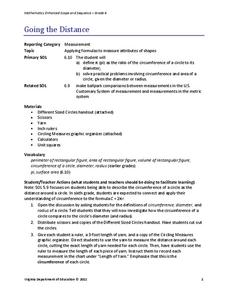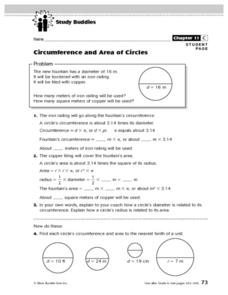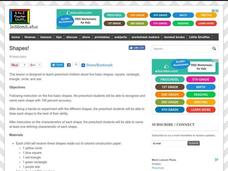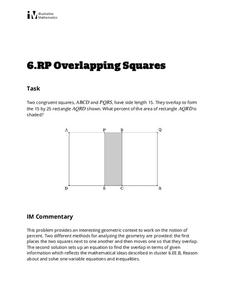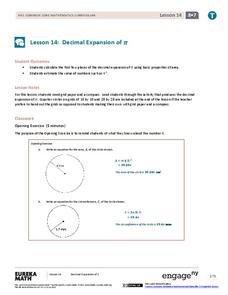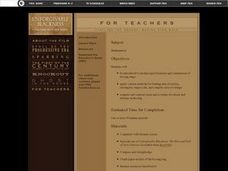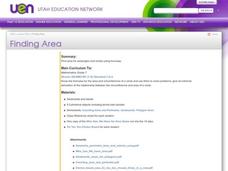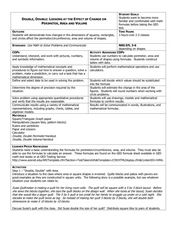Curated OER
Geoboard Squares
Young scholars create squares of different sizes on a geoboard. They find and describe a pattern. Students use the pattern to determine the number of squares possible on a 10-by-10 geoboard. They create squares with a horizontal base...
Virginia Department of Education
Going the Distance
Estimate the value of one of the most famous irrational numbers. The hands-on lesson instructs classmates to measure the circumference and diameters of circles using yarn. The ratio of these quantities defines pi.
Curated OER
Area and Perimeter of Polygons
In this geometry worksheet, 10th graders calculate the perimeter and area using the specific formula for that polygon. There are 5 questions with an answer key.
Curated OER
Volume and Surface Area of Right Rectangular Prisms
Students identify the formulas for three-dimensional figures. They use manipulatives to model problems. Students create foldables and explain volume and surface area. Students complete worksheets and classify solids. Students sing a...
Curated OER
The Gum Drop
Students find the area of three figure by the traditional formulaic methods. Then they count the number of grid squares to double check. They show an intuitive sense of Pick's Algorithm by counting every two boundary squares as one unit....
Curated OER
Circumference and Area of Circles
In this math worksheet, students learn to calculate the area and circumference of a circle. Students answer 4 word problems after reading the information and studying the examples.
Curated OER
Shapes!
Explore five basic shapes- square, rectangle, triangle, circle, and stars with youngsters. They will participate in hands-on activities, draw each shape, name each shape. They also get to eat things that are in the shapes they have just...
Curated OER
Investigation Designing a Patchwork Quilt
Fourth graders practice calculating area by creating a classroom quilt. Students are given a 6x6 inch square material they design based on a classroom theme. A sample of the class quilt is created using graph paper so students may...
Curated OER
Bubble Mania
Elementary schoolers practice measuring a soap bubble print. They follow a recipe to make a soap bubble solution. Pupils use the soapy solution to blow large bubbles with a plastic drinking straw until they pop leaving behind a circular...
Illustrative Mathematics
Overlapping Squares
The objective of this activity is to find the percent of the area of a two squares overlapping. Mathematicians find the ratio of area for the part that overlaps to the rectangle formed. The final answer is a percent as a rate per 100....
Houghton Mifflin Harcourt
Developing Formulas for Circles and Regular Polygons
Formulas and procedures for finding the area and circumference are not provided on this handout, so it will be best used as a practice of already-acquired skills. It is a well-rounded assignment, however, as it includes diagrams,...
EngageNY
Decimal Expansion of Pi
Develop a better understanding of the value of pi. Learners explore the area of a circle using estimation and graph paper. While continuing to estimate the area of the circle using smaller and smaller grids, the number pi emerges.
Curated OER
Circling the Square: Boxing Ring Match
Students analyze the specifications and construction of modern boxing rings. They calculate the area of circles and rectangles by different methods. They compare and contrast different areas in the ring used for attack and defense.
Curated OER
Ara of Circles
Young scholars identify the differentiate the different properties of circles and parallelograms. In this geometry lesson, students calculate the area of each solid and identify the formula. They relate Pi to the circumference of a circle.
Curated OER
Area of Complex Figures
Fifth graders use formulas for calculating areas of squares and rectangles to find area of complex figure, compare their own ideas with their classmates' ideas, and recognize that there are multiple methods for finding area of complex...
Curated OER
Geometry: Area Project
Sixth graders identify and use area formulas for finding the area of geometric shapes.
Curated OER
Finding Area
Seventh graders explore the concept of area. In this area lesson, 7th graders determine what measurements are necessary to find the area of a rectangle and circle. Students use area formulas to calculate area or rectangles and circles.
Curated OER
Area Of A Circle
Fifth graders experience a instructional activity to investigate the methods for finding the area of a circle. They use the drawing of segments in order to visualize how a circle can be proposed of many parts. Then students brainstorm in...
Curated OER
Introductory to Area (Squares, Rectangles, and Triangles)
Middle schoolers explore the concept of finding area. In this finding area lesson, students use knowledge of area of triangles to find area of squares and rectangles. Middle schoolers find area of irregular figures by breaking the...
Curated OER
Double, Double: Looking at the Effect of Change on Perimeter, Area and Volume
Learners explore perimeter, volume, and area. In this math lesson plan, students explore how changes in dimensions of geometric shapes affect the perimeter, area and volume of the various shapes. Learners investigate the results when the...
Curated OER
Area, Perimeter Word Puzzle
Students measure planes and solids. In this geometry instructional activity, students find the area and perimeter of different polygons.They complete a word puzzle to review their vocabulary words.
Curated OER
Surface Area with Polydrons
Students explore measurements by analyzing geometric shapes. In this surface area instructional activity, students identify the terms volume, weight, perimeter and area in order to find the requested measurements of specific polygons....
Curated OER
Geography: Lengths, Perimeter, and Area of Similar Objects
Sixth graders explore characteristics of similar objects. Using attribute blocks, they explore the ratios of the perimeter, area and side length in similar shapes. They calculate and compare the area of shapes.
Curated OER
ExplorA-Pond:4th Grade Surface Area
Fourth graders estimate the surface area of a pond using the chance method and the estimation method. They complete a graph and a short report comparing the results of the two methods.

